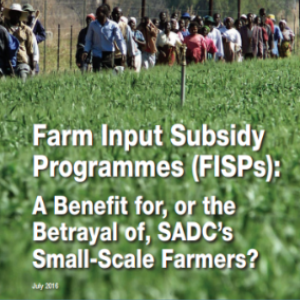
This report by the African Centre for Biodiversity argues that the Farm Input Subsidy Programmes (FISPs) have not achieved their intended goals in a number of African countries where they have been implemented. In its highly critical analysis the report argues that they consume large parts of agricultural and even national budgets and are largely ineffective social transfer schemes that create dependency.
The report also argues that the motivation for these programmes is aligned to non-economic rationales for subsidy use; i.e. enhancing food security and reducing poverty and that in many countries they are used to gain political favour. The report shows that ten African governments have spent more than US$ 1 billion, close on 30% of their agricultural budgets, on large-scale farm input subsidy programmes (FISPs) since 2000. The programmes, providing between 30–100% subsidies on the price of fertiliser and seed (normally hybrid maize), aim to reduce food insecurity and reduce rural poverty. Of the 15 countries that comprise the Southern African Development Community (SADC), Botswana and Lesotho offer universal input subsidy schemes, and Malawi, Mauritius, Mozambique, Namibia, Swaziland, Tanzania, Zambia and Zimbabwe provide targeted, large-scale programmes. The remaining countries, including South Africa, practice ad hoc subsidisation.
Country examples from the report:
- In Malawi there is a net transfer away from rural households who have embraced Green Revolution inputs because the additional cost is not always recouped from the sale of the harvest. There is evidence that data has been manipulated and yields overestimated. A government study found that rural poverty levels actually increased after the introduction of Malawi’s FISP in 2005. It does not appear that the FISPs help small-scale farmers (particularly the most vulnerable, such as women) in a long-term, supportive and sustainable way.
- In Botswana, the introduction of the FISP has increased the number of subsistence farmers in the country.
- The FISPs also tend to be used to gain political favour. This is true in Malawi, Tanzania and Zambia, and evidence suggests that significant amounts of inputs are diverted or leaked onto secondary markets by politicians or wealthy elites. An estimated 60% of all inputs are lost in this way in Tanzania.
The conclusion of this report is thus that FISPS do not help build the resilient, sustainable farming and food systems that are necessary in a world facing diverse ecological, economic and social challenges. The authors argue that a transition to agro-ecology is required as a matter of urgency, to bring about the sustainable food systems of the future, formed through the collective, inclusive and democratic co-generation of the knowledge held by farmers, consumers and African governments.
You can read the full report here.
Read more about economy, governance and policy, subsidies, food and agriculture policy, political economy.












Post a new comment »